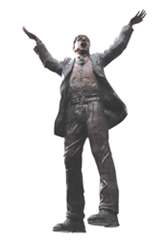Equality for Irish unions
 Legislation promised by the Government will ensure union rights in Ireland are brought into line with Europe, according to ICTU’s Macdara Doyle.
Legislation promised by the Government will ensure union rights in Ireland are brought into line with Europe, according to ICTU’s Macdara Doyle.
On 22 March, Congress General Secretary David Begg met with the German Chancellor, Dr Angela Merkel.
Mr Begg was part of a small, select delegation that included trade union leaders from Italy, France, Belgium, Spain and the Czech Republic.
Ahead of the encounter, Mr Begg told the Irish Times that he would use the opportunity to tell Chancellor Merkel that Ireland faces a “decade of despondency” unless EU austerity policy is matched with economic stimulus measures.
Speaking afterwards he said that Chancellor Merkel had listened politely and attentively to all contributors, during the hour-long encounter.
The visit and meeting with Chancellor Merkel was organised by the Confederation of German Trade Unions – Deutscher Gewerkschaftsbund – or DGB. The EU delegation also met with senior figures from the opposition Social Democrats (SPD) and other key members of the Bundestag.
That the leader of Europe’s strongest economic power should, in the midst of an existential crisis for the euro zone, take the time to have a serious and substantive engagement with key European Union leaders says a great deal about the role of trade unions in Europe’s more developed societies and economies.
Indeed, across Europe’s key economies ‘social dialogue’ provided a crucial element to the post war reconstruction programme embarked upon after 1945. That goes some way to explaining the almost consensual manner in which many northern European countries go about their business. Because there is a more inclusive process, there is greater understanding and awareness of key social and economic changes.
By contrast, countries such as the UK often adopted a far more confrontational approach, as evidenced by the Thatcher years and the dreaded spectre of the ‘enemy within’. In truth, it was cartoonish politics that ultimately did the UK significant damage.
Elements of both approaches are evident in Ireland where, uniquely in the developed world, trade unions enjoy no legal right to recognition and activists who attempt to organise can and are targeted and victimised.
And it’s all perfectly legal, at least in the sense that successive Irish lawmakers just never got around to introducing such protections for people who are doing no more than attempting to validate their constitutional rights and the rights afforded to them under the Universal Declaration of Human Rights.
Thus workers in Ireland enjoy the constitutional right to join a trade union but, if sacked for organising, have no real recourse under the law. This is in breach of so many accepted human rights and labour rights conventions and principles that it is hard to know where to begin. It also tends to give the lie to the near hysterical ravings heard from the right of the political spectrum which bemoan how unions ‘ran the country’ during the years of social partnership. Access and influence should not be confused. Wasn’t that a key lesson from the Mahon tribunal report?
Indeed, it recently landed Ireland in hot water with the international human rights’ community and saw Justice Minister Alan Shatter queried on this curious ‘anomaly’ at a hearing of the United Nations Human Rights’ Council, in Geneva, late last year.
Congress made its own submission to the Human Rights Council, outlining this serious flaw in domestic legislation. A full copy of the submission is available at www.ictu.ie/publications/fulllist/ictu-submission-to-the-universal-periodic-review-2
In March, the Government issued its formal response to the Human Rights Council and confirmed, thankfully, that it intended to legislate to ensure union rights in Ireland are brought into line with human rights standards across the European Union.
With luck, we will see such legislation introduced before the end of this year, just in time for the one hundredth anniversary of the 1913 Lockout. It’s a long time coming.





